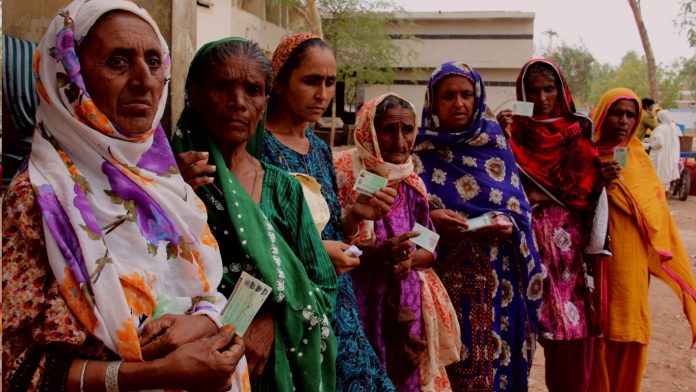ISLAMABAD, December 10, 2024: The Parliament, political parties, Election Commission of Pakistan (ECP), and civil society must join forces to enhance the participation of women as voters and candidates in electoral processes.
This consensus emerged during the launch of the Free and Fair Election Network (FAFEN)’s report, Women in Elections, which analyzes women’s participation in the General Elections (GE) 2024. The event, organized as part of FAFEN’s International Human Rights Day celebrations and the culmination of the 16 Days of Activism against Gender-Based Violence, brought together sitting and former women parliamentarians from the Pakistan Muslim League Nawaz, Pakistan Peoples Party Parliamentarians, Jamaat-e-Islami, Jamiat Ulema-e-Islam Pakistan, and Qaumi Watan Party, along with representatives from other political parties, civil society, election experts, and journalists.
The participants stressed upon the urgent need for comprehensive electoral reforms ahead of the next general elections to enhance women’s participation as voters and candidates while emphasizing the importance of promoting intra-party democracy to ensure women’s meaningful participation in political and electoral processes. FAFEN National Council member Ms. Anbreen Ajaib highlighted the urgency of electoral reforms to ensure gender parity, noting that while the narrowing gender deficit is a promising development, significant work remains to achieve equitable representation for women in the political sphere.
Ms. Kanwal Mehmood, Assistant Manager, presented the report’s findings, which showcased a significant rise in women’s participation as voters, polling staff, and candidates. She revealed that women cast 24.4 million of the 58.9 million total votes in GE-2024, reflecting an increase of 2.7 million compared to GE-2018, nearly double the increase observed in votes cast by men, which rose by 1.6 million. Additionally, the number of female candidates contesting GE-2024 nearly doubled compared to GE-2018, driven largely by a notable surge in independent female candidates.
The report emphasizes prioritizing women voter registration in constituencies where the gender gap in electoral rolls still exceeds 10 percent, while advocating for a reduced threshold of five percent in constituencies where the gap has already fallen below 10 percent.
To improve women’s voter turnout, the report suggests considering legal amendments to enforce the existing minimum requirement of 10 percent female turnout at the polling station level. In extreme cases, where low turnout at certain polling stations could significantly impact the election outcome, it recommends empowering the Election Commission to call for a re-poll in those areas where the number of registered voters at such stations exceeds the margin of victory.
For enhancing women’s electoral participation as candidates, FAFEN proposes the development of a comprehensive, long-term strategy addressing the legal, socio-political, and institutional barriers that hinder a substantial increase in the number of female candidates contesting elections.
Chairperson FAFEN Mukhtar Javed concluded the event by underscoring the report’s significance in promoting women’s political empowerment and human rights. He reaffirmed FAFEN’s commitment to fostering an inclusive electoral environment and addressing societal polarization to strengthen democratic processes.
Click here to download the complete report




